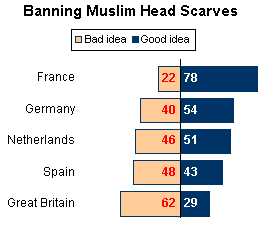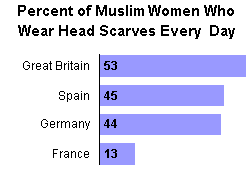by Richard Morin and Juliana Menasce Horowitz
The Netherlands announced plans on Friday for legislation that would ban veils and other clothing that covers the face, instantly moving to the forefront of a debate raging throughout Europe over how far to go to limit displays of Muslim religious identity.
The announcement came as the Dutch prepare for national elections this week in which concerns over immigration and the country’s swelling Muslim population are playing a key role. The government already allows individual schools to ban head scarves, a move that came after France banned the wearing of religious symbols in public schools.

Throughout Europe governments are wrestling with how far to go to respond to calls to lift the veil and ban the head scarf. While the issue in the Netherlands involves full-face veils or burqas, head scarves also have divided publics across the continent. A 2005 Pew Global Attitudes Project survey in the Netherlands found that 51% of the Dutch public favored banning head scarves in public.1 In Germany, 54% also supported a ban while in France an even larger majority — 78% — did so. But in Great Britain, a solid majority (62%) thought the banning of scarves was a bad idea.
Opinion was more evenly divided in Spain, where 43% said the ban is a good idea and 48% opposed it.
However, these views may have changed in Great Britain and elsewhere in Europe since the Pew survey was conducted in the Spring of 2005. In August 2006, British authorities foiled a terrorist plot by British Muslims to blow up airliners bound for the United States. And in France, young Muslims were believed to make up the majority of those who participated in the rioting that swept through several cities beginning in late October of last year.
In the Pew survey, views on the scarf ban were closely tied to overall attitudes toward Muslims, with those with negative views of Muslims far more inclined to embrace the ban than those with more positive views. For example, in Great Britain, 55% of those with an unfavorable view of Muslims favored a scarf ban compared with 23% of those who expressed a positive view of Muslims. A similar pattern emerged in Germany, the Netherlands and Spain while in France, support for a ban was high both among favorable (74%) and unfavorable (86%) views of Muslims.
Another Pew Global Attitudes Project survey conducted earlier this year in France, Germany, Great Britain, and Spain finds that a majority of Muslim women in Great Britain and Spain and just under half of Muslim women in Germany cover their heads every day or almost every day.2

In Great Britain, where the debate over head scarves and veils has become particularly heated following former foreign secretary Jack Straw’s recent comments that the full-face veil is “a visible statement of separation and of difference,” more than half of Muslim women report wearing the head scarf every day. Slightly more than four-in-ten Muslim women in Spain and Germany cover their heads daily, while an additional two-in-ten in Spain and nearly one-in-six in Germany do so at least occasionally. About a third of Muslim women in Spain and 41% in Germany never cover their heads.
Only in France do a large majority of Muslim women (73%) say they “never” wear the religiously prescribed head covering. This reflects other survey results that show French Muslims generally are less likely to identify primarily as Muslims than are their counterparts in other European countries.3 Still, one-in-eight say they follow the dictates of their faith and cover their heads every day.
While the recent British controversy involved the full-face veil, the less extreme and more common practice of wearing head scarves has also drawn official fire in Europe. In addition to France, where head scarves and other religious symbols were banned in public schools in 2004, at least four German states have banned teachers from wearing head scarves and in the state of Hesse the ban applies to all civil servants. In Denmark, the High Court ruled last year that a Danish supermarket chain had the right to ban employees from wearing religious head scarves.




